Memorable moments: Cyclingnews' selection of unforgettable Tour de France events
Staff recall favourite French Grand Tour moments
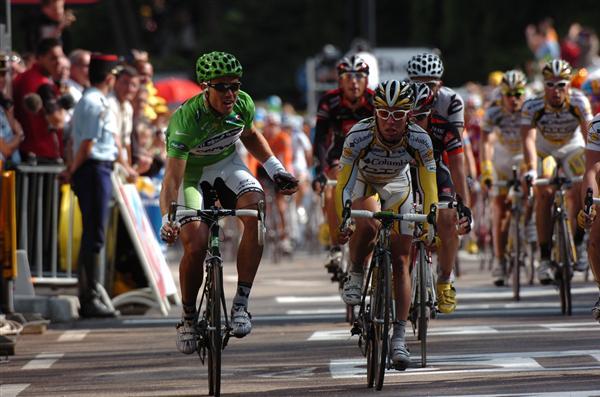
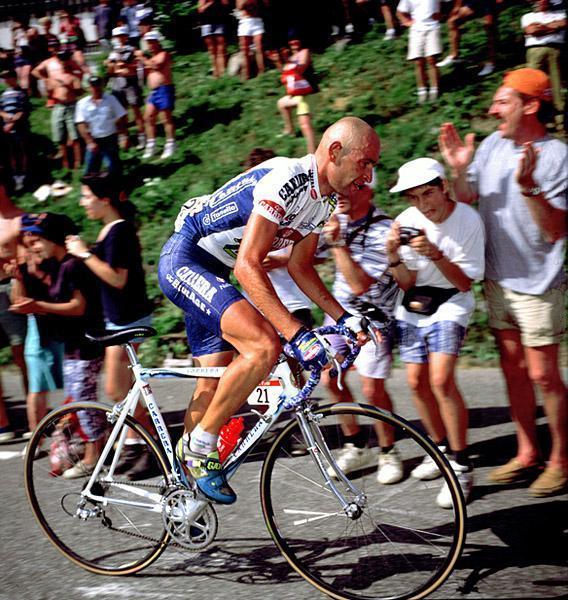
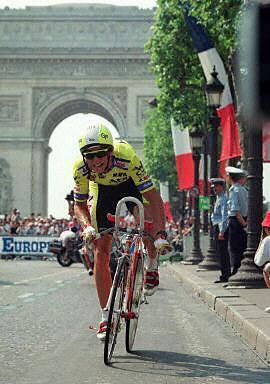

Everyone has a favourite Tour de France moment – regardless of how big or small a role it played in the eventual outcome of a race. Many of our readers shared their favourite moments with us via our Facebook page last week, so we thought we’d take a moment to detail some of ours.
While we could have named hundreds of exciting events from the French Grand Tour’s long history, we’ve selected ten below that are close to each of us for one reason or another. If you'd like to share your favourite Tour moment with us, you can either by adding to the list on Facebook or in the Cyclingnews forum.
It’s not easy being green
Who: Mark Cavendish, Thor Hushovd
Where: Col des Saisies, Cote d'Arâches
When: 2009
A fiery battle for the green sprint jersey between HTC-Columbia’s Mark Cavendish and Cervelo Test Team’s Thor Hushovd boiled over at last year’s Tour de France. Cavendish was outraged when he was relegated for irregular sprinting against the Norwegian on Stage 14, a decision that was handed down before Cervelo even had a chance to protest.
The Manxman said the jersey was stained after that decision, but Hushovd was determined to restore its credibility. As the Tour hit the Alpine mountains near Le Grand-Bornand on Stage 17, Hushovd launched a solo attack that would win him even Cavendish’s praise.
He went clear of the main group on the first climb up the Cormet de Roselend, caught and passed the lead escape group on the descent, and remained solo over the Col des Saisies and Cote d'Arâches climbs. The attack gave Hushovd a further 12 points in the classification, to which Cavendish responded by calling him a deserving winner.
The latest race content, interviews, features, reviews and expert buying guides, direct to your inbox!
Ullrich sacrifices results for sportsmanship
Who: Jan Ullrich, Lance Armstrong
Where: Luz Ardiden
When: 2003
The 2003 Tour de France was arguably Jan Ullrich's best chance to capture a second title. After crushing Lance Armstrong in a blazing hot 47km time trial and then gaining more time in the first Pyrenean mountain finish, the big German was just 15 seconds behind the then-four time Tour winner. On the final climb to Luz Ardiden, hearts around the world briefly stopped when Armstrong was suddenly pulled down by a fan's souvenir musette bag.
Ullrich, who had been in the group with Armstrong could have, and maybe should have, taken this opportunity to attack and gain time, but he didn't. Had he kept going, he might have ended up in the maillot jaune and been reviled for attacking the race leader while he was down. Instead, he waited and was lauded by press around the world as demonstrating great sportsmanship, but he lost the Tour de France.
After his crash, Armstrong re-mounted and, despite battling a dodgy bike that dropped him on the top tube once, rejoined the Ullrich group and then attacked to win the stage and move one step closer to his fifth Tour win. At the end of the day, Ullrich lost over 40 seconds. He ended his last chance to gain back that time in the final time trial to Nantes with a spectacular crash on a wet roundabout and wound up the Tour's runner-up for the fourth time - losing by 1:01 minutes.
Crash carnage on Bastille Day
Who: Joseba Beloki, Lance Armstrong
Where: Col de la Rochette
When: 2003
Another episode to remember of that epic 2003 edition of the Tour de France was the Col de la Rochette descent to Gap on July 14, Bastille Day. That day effectively ended Joseba Beloki's career as a professional bike racer - while he was placed second overall in the race, just 40 second behind Lance Armstrong.
In pursuit of the later stage winner Alexander Vinokourov, Beloki lost control of his bike on a patch of tarmac that was melted by the sun, and hit the road hard, skidding out of a sharp hairpin into a field. The Spaniard suffered breaks in his femur, elbow and wrist, and never really recovered from his injuries. He tried a come-back with Brioches La Boulangère and Liberty Seguros later, but failed to attain top level ever again.
But the crash did not end there. Live TV coverage made cycling lovers all over the world hold their breath when Lance Armstrong, following Beloki just a few metres behind, swerved to avoid the falling rider and headed off the road and across the field. To rejoin the road, the American had to unclip, shoulder his bike and jump over a ravine, cyclo-cross-style. Armstrong continued the race, and lost one of his main rivals that day.
Crash on Passage du Gois
Who: Ivan Gotti, Alex Zulle, Wladimir Belli, Michael Boogerd, Christophe Rinero, Jean-Cyril Robin, Jonathan Vaughters (to name a few)
Where: Gois
When: 1999
No matter how meticulously a rider prepares for the Tour de France, the race can be fraught with obstacles that can ruin his chances. Several favorites found this out firsthand at the 1999 edition when they were knocked out of contention early in the race. The incident came in the second stage on the Passage du Gois, a periodically flooded road which connects the island of Noirmoutier to the mainland, when a crash split the peloton.
Riders like Ivan Gotti (Giro d'Italia winner), Alex Zulle (on his birthday), Festina's Vladimir Belli, Michael Boogerd, Christophe Rinero and Jean-Cyril Robin (the top two French riders the previous year) were left desperately chasing the 70-storng front group that was rapidly receding out of sight.
Up front, ONCE and Cofidis drove the pace for Abraham Olano and Bobby Julich, respectively, while Lance Armstrong and his young US Postal team also contributed to the work to stunning effect. In the first hour of the race, the average speed was 32.9kph. In the hour after the crash, it was 46.822kph.
Zulle would rue the six minutes he lost that day to the very end of the race in Paris, when he finished second to Armstrong, 7:37 down in the overall classification.
Just 70 riders were left for the sprint, which was won by Belgian Tom Steels. Estonian Jaan Kirsipuu rode well enough to take the maillot jaune from Armstrong.
'Il Pirata' arrives on the Tour's grand stage
Who: Marco Pantani
Where: Alpe d'Huez
When: 1995
Having won the best young rider classification at the previous year's Tour de France, Marco Pantani started the 1995 edition of the race in unknown form, reflected in his 105th in the Saint Brieuc prologue. An anonymous first week was easily forgotten by what came in the 10th stage, however.
On one of the race's most iconic peaks, Alpe d'Huez, Pantani left the peloton reeling such was the ferocity of the Italian's attack that came 13km from the finish.
Climbing standing and seated, Pantani made riders in the early break appear to be heading backwards. Countryman Ivan Gotti, who along with Frenchman Richard Virenque was one of the last to fall to Pantani's devastating attack, spoke years later of Pantani's great mental strength in addition to his physical prowess on the famous peaks that day in July 1995.
Watching the ride, it's obvious to see why 'Il Pirata' won so many fans' hearts with these types of performances. Four days later Carrera's firebrand climber would repeat the feat in Guzet Niege, finishing 2:31 ahead of eventual champion Miguel Indurain, whose position as the Tour's king looked under threat from this irresistible Italian force.
It was the real start of a legend, and like all enduring legacies it was full of emotion, faults and regret... from a life cut tragically short. But on July 12, 1995 Marco Pantani was on top of the cycling world, regardless of what would happen in the years ahead.

Marco Pantani on Alpe d'Huez at the 1995 Tour de France.
Time trial for the ages
Who: Greg LeMond, Laurent Fignon
Where: Champs-Élysées
When: 1989
The 1989 Tour de France oozed drama from start to finish, but it was Greg LeMond's otherworldly time trial performance on the final day which forever sealed the American's place in sporting legend. LeMond completed a comeback from a near-fatal gunshot wound in 1987 to win cycling's showcase event.
LeMond and Laurent Fignon fought tooth and nail for Tour supremacy that year, with the American and Frenchman swapping the yellow jersey back and forth from stage five through to the finish.
Fignon stretched a tenuous 26-second advantage over LeMond to 50 seconds with a solo stage win on stage 19 and seemingly had the race under control entering the Tour's endgame.
The concluding 21st stage, a 24.5km race of truth finishing on the Champs-Élysées, seemed to be a formality. Losing two seconds per kilometre was unfathomable, surely Fignon had his third Tour victory sewn up.
LeMond thought otherwise.
That Sunday afternoon the 28-year-old American rolled out of the start house, got his 55x12 top gear up to speed, tucked into his then-revolutionary ‘triathlon bars’, and clocked the fastest time trial in Tour de France history: 54.545 km/hr to finish in 26:57.
Fignon followed in LeMond's wake, utterly stunned at the time checks from sport director Cyrille Guimard. Fignon finished third on the stage to LeMond, but conceded a staggering 58 seconds to lose yellow by the narrowest margin in Tour history: eight seconds.
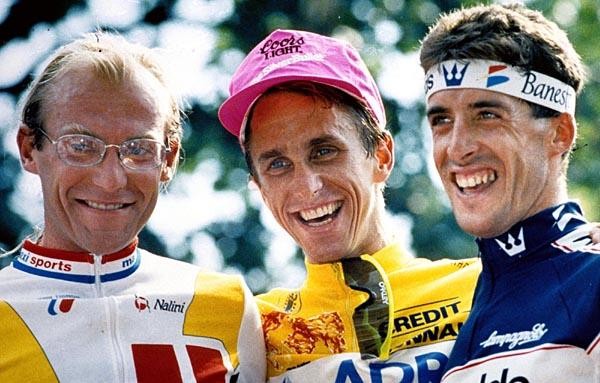
A temporary truce en route to Briançon
Who: Gino Bartali, Fausto Coppi
Where: Briançon
When: 1949
The well documented rivalry between Gino Bartali and Fausto Coppi was perhaps at its height in the months prior to the 1949 Tour de France. Bartali had agreed to support his teammate at the French race, and the pair tore the peloton apart.
But having divided Italian cycling fans from the nation’s north and south for nearly a decade, an unlikely truce occurred during the race’s Stage 16. Coppi waited for Bartali when he punctured on the Izoard, a gesture that was returned later when Bartali suffered from the same issue.
It was a softening in a bitter rivalry that led to Coppi allowing his teammate to claim the stage victory on the final climb to Briançon. Stage victory gave Bartali the opportunity to don the race’s yellow jersey on his 35th birthday.
Bartali lost the jersey to his teammate the following day after another puncture and the pair went on to claim a dominant one-two overall, but it was the events of Stage 16 that the edition is remembered by. It occurred in the same year the pair were suspended by the national cycling federation for riding against, not in support of, one another at the world championships.
Guerini bounces back – Alpe d'Huez, 1999
Who: Giuseppe Guerini
Where: Alpe d'Huez
When: 1999
Giuseppe Guerini of Team Telekom had a different type of mishap, one that had little consequence but made him a household name if only because of the bizarre nature of his incident.
The Italian had attacked out of the lead group on the way up the legendary Alpe d'Huez. The wiry climber got away easily with 2.8 km to go and looked like he would have a clear run-in.
Stomping on the pedals, inside the final kilometre, Guerini negotiated the hoards of fans which lined the roadside, all angling to catch a glimpse of the approaching race. The seas parted for a moment, leaving one soon to be famous photographer standing squarely in the middle of the road.
Guerini decided to try to go around the boy on the left while the fan also tried to get out of the way in the same direction. The resulting collision knocked Guerini straight down, but he quickly re-mounted his bike and after a moment's panic, continued on his way to the victory. Guerini had built up enough of a lead on the switchbacks that he still won by 21 seconds over Pavel Tonkov.
A dog day afternoon
Who: Sandy Casar
Where: Angoulême
When: 2007
The 2007 Tour descended into farce due to the contentious presence of Michael Rasmussen, but some dignity was restored with Sandy Casar's stirring stage win in Angoulême in the final week.
Driving the break of the day, the Frenchman fell off in bizarre circumstances when a dog ran across the road and knocked him from his bike. Casar remounted, gave chase, attacked in the finale, was caught 500m from the line and then edged a thrilling sprint to take the spoils.
In another era, Casar may arguably have had a richer palmares, but his steadfast adherence to Tour's ideals of hardship and perseverance, encapsulated by this stage win, remains a fine contribution to the race's rich history.
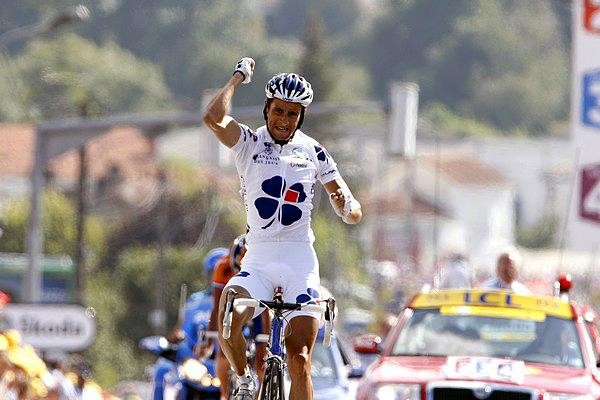
Great games on the Galibier
Who: Marco Pantani
Where: The Col du Galibier
When: 1998
Marco Pantani is often remembered for the many doping accusations that tainted his career but his attack on the Galibier personified his attacking style mountains. It set up his 1998 Tour de France victory - the first Italian to win the Tour for 33 years.
Pantani, 3:01 down on the overall classification at the start of the final week, jumped away in the pouring rain, putting pressure on Jan Ullrich who held the maillot jaune.
In stark contrast to the Italian's fluid style, Ullrich looked strained, his eyes puffy, mouth contorted in a rictus of pain. On the treacherous descent, Pantani hurtled through the many bends while Ullrich gingerly made his way down and Bobby Julich, in pursuit ahead, lost control and ended up in a spectator's caravan.
In one of the most successful attacks in recent Tour history, Pantani went on to finish 8:57 ahead of Jan Ullrich in Les Deux Alpes and pulled on the yellow jersey. He eventually reached Paris 3:21 ahead of Ullrich, with Bobby Julich third at 4:08. He became only the seventh rider to ever win the Giro d'Italia and the Tour de France in the same season.